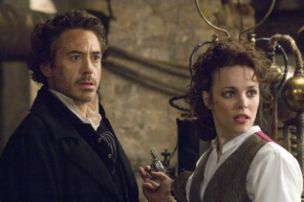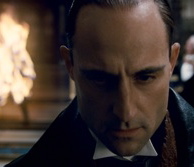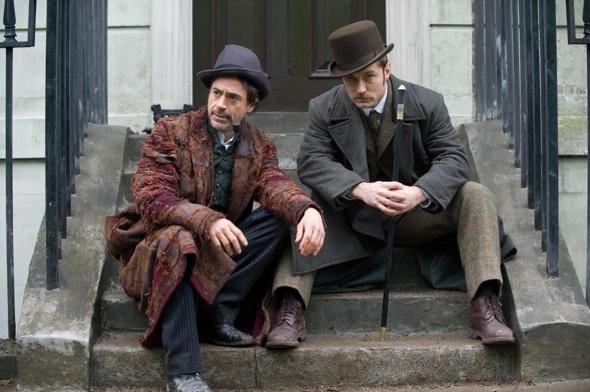If James Bond could survive Roger Moore and George Lazenby, there must be grounds for optimism that Sherlock Holmes will eventually recover from this brutal mauling by Robert Downey Jr, under the gaudy directorial eye of Guy Ritchie. Holmesophiles are a doughty bunch, and will probably just carry on watching Basil Rathbone and Jeremy Brett as if Mr Madonna never happened.
It isn’t so much a bad film as just too much of one, and Ritchie could have done all of us a big favour by lopping 20 minutes off the 128 he has over-generously left us with. It’s the familiar saga of Hollywood bloat. Arthur Conan Doyle’s original stories were as much about the labyrinthine mind of his indestructible sleuth as about external locations, but, armed with an $80million budget, Ritchie has gone on a CGI-rampage through a fantastical Victorian London which, if nothing else, might attract an influx of starry-eyed tourists to replace the fleeing hordes of bankers.
Piccadilly Circus has been recreated in pristine pre-neon splendour, there’s an intoxicating sequence of a steam-launch chugging up the Thames amidst a panoramic cityscape bathed in luminous moonlight, and Holmes and Watson even manage to launch, and sink, a huge iron ship as an incidental backdrop to one of their numerous fight sequences. A half-finished Tower Bridge soars above the river, an emblem of Imperial energy and ingenuity, and the setting for an inevitable bridge-hanging climax.
 The film’s saving grace is the sly humour that infiltrates its giant set-pieces, which helps to render this Holmes-Watson partnership more a matter of contrasting equals than the traditional pairing of a self-obsessed genius with a tweedy, port-soaked old buffer. Having never been able to comprehend how the blank and gormless Jude Law ever became a major Hollywood face, I was amazed to find myself rather impressed with his performance as Watson. Crisp, clipped and carrying a slight limp from his military past, this Watson is an energetic and capable figure, a dead shot with a revolver and helpfully indestructible in strenous bouts of unarmed combat. He even comes equipped with a life beyond the confines of Holmes’ shambolic lair at 221B Baker Street, and is about to move out and set up home with the winsome Mary Morstan (Kelly Reilly).
The film’s saving grace is the sly humour that infiltrates its giant set-pieces, which helps to render this Holmes-Watson partnership more a matter of contrasting equals than the traditional pairing of a self-obsessed genius with a tweedy, port-soaked old buffer. Having never been able to comprehend how the blank and gormless Jude Law ever became a major Hollywood face, I was amazed to find myself rather impressed with his performance as Watson. Crisp, clipped and carrying a slight limp from his military past, this Watson is an energetic and capable figure, a dead shot with a revolver and helpfully indestructible in strenous bouts of unarmed combat. He even comes equipped with a life beyond the confines of Holmes’ shambolic lair at 221B Baker Street, and is about to move out and set up home with the winsome Mary Morstan (Kelly Reilly).
The way Holmes deploys devious strategems to try to stop him (Downey pictured above left with Rachel McAdams as Irene) suggests the screenwriters have been studying the antics of TV's Dr Gregory House, a character created in part-homage to the Great Detective. Watson’s exasperation with Holmes’ ever-more outlandish behaviour is a device to try to contain the detective within the outer limits of the narrative, but every viewer will have to decide whether to run with the grandstanding energy of Downey’s performance (think Batman with a dose of Inspector Gadget) or write it off as a thespian multi-vehicle pile-up.
Everything about it is magnified, inflated and speeded up. His legendary deductive powers now allow him to meet a person for a few moments and then reel off a database of information about their past, present, future and personal circumstances. Confronted with physical danger, Holmes (who indulges in bloody bouts of bare-knuckle boxing in his spare time) freezes the action while he plots his next 10 moves to neutralise his opponent, then carries them out in a blitz of extreme close-ups and high-definition slo-mo. Watson's faithful bulldog Gladstone becomes an unwitting test-bed for Holmes’ fidgety experiments with hazardous tinctures, lotions and potions.
 Such appears to be the confidence of Ritchie and Warner Bros about the franchiseability of this new-look Holmes that arch-nemesis Moriarty barely gets a look in here, since he’s being held in reserve for the follow-up. The villain du jour is Lord Blackwood, played by an aquiline-featured Mark Strong (pictured right) like a mixture of Satan and Heinrich Himmler. Nothing so mundane as murder or theft for him – he’s at the hub of a fiendish conspiracy to wipe out Parliament and take over the world, with the aid of mind-blowing scientific apparatus and a positively Mandelsonian capacity for coming back from the dead.
Such appears to be the confidence of Ritchie and Warner Bros about the franchiseability of this new-look Holmes that arch-nemesis Moriarty barely gets a look in here, since he’s being held in reserve for the follow-up. The villain du jour is Lord Blackwood, played by an aquiline-featured Mark Strong (pictured right) like a mixture of Satan and Heinrich Himmler. Nothing so mundane as murder or theft for him – he’s at the hub of a fiendish conspiracy to wipe out Parliament and take over the world, with the aid of mind-blowing scientific apparatus and a positively Mandelsonian capacity for coming back from the dead.
Intermittently it’s a lot of fun, but in between there are slowly crawling minutes of indigestible narrative and unfathomable plotting, and you wish you could hear more of what Downey was speed-burbling to himself in between battles with a towering Frenchman or encounters with the pretty but structurally marginal Irene. Put it this way – I really enjoyed the good bits.















Add comment